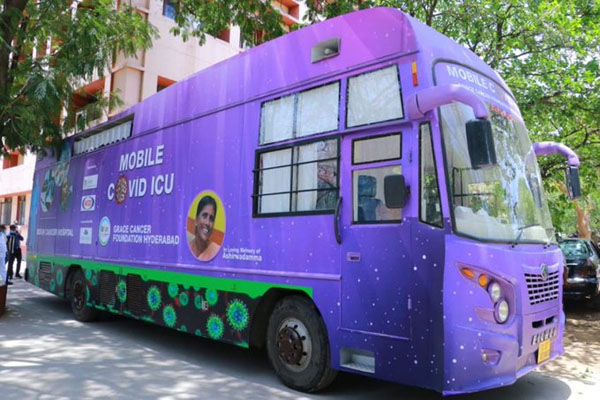A charity organisation has developed a mobile intensive care unit equipped with two ventilators and three beds in a bus for Covid-19 patients.
The MCICU, as the mobile Covid-19 ICU is called, has state-of-the-art facilities like ventilator, imaging, tele radiology, e-ICU, ultrasound and Artificial Intelligence-based risk stratification. Swab samples of the patients can also be collected in a contactless manner in this mobile ICU.
The MCICU, conceptualised by Grace Cancer Foundation and developed in partnership with others, can be positioned in areas of the greatest need.
The developers said it is aimed to save precious lives as it takes advanced critical care to mofussil and rural areas where such facilities are lacking.
They say the facility can be of great help in dealing with the Covid situation, especially considering the fact that there is a huge shortage of ventilator equipped beds in the country and the existing infrastructure is largely concentrated in metros and state capitals.
It also supplements the government capacity for testing and awareness building. It is one step ahead of mobile testing as it moves to therapeutic care as well. It can perhaps be a model for rapid scaling should that be needed, said Dr Chinnababu Sunkavalli, CEO, Grace Cancer Foundation.
“There is a great need to supplement the efforts of the governments to combat the disease spread effectively. Innovative solutions that are accessible and affordable and the involvement of NGOs can help mitigate the burden”, he said.
The unique initiative by the Foundation is supported by Liberty General Insurance and NATCO Pharma.
The International Institute of Information Technology (IIIT), Hyderabad is the data and technology partner of the facility.
According to the developers, the mobile ICU increases the capacity of ventilators where the shortage is likely to be critical, especially in the district and block level hospitals. Easy mobility enhances the usage potential of the ventilators in a hyper local environment. The cost of building the unit is up to 50 per cent lower than doing the same in a hospital context.
It can be expeditiously assembled and made functional in less than 10 days.



































